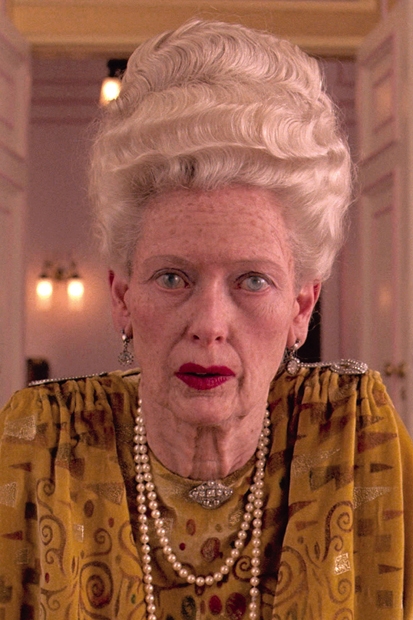The Grand Budapest Hotel is the latest Wes Anderson film and it is beautiful to look at, scrumptious, luscious, such a delicious confection I would have marched up to the screen and licked it if only, at the screening I attended, Mark Kermode had not been occupying the seat in front, and it would have meant scrambling over him, and maybe ruining his hair. (A quiff like that doesn’t hairdress itself, you know.) So I stayed put, feasting with my eyes — on the film, not the quiff — so it was sensually satisfying, but emotionally satisfying? Not so much, alas. Divine pastries, divine clothes, divine period trappings, but, as with most of Anderson’s films, I was never moved or understood what mattered, if any of it mattered. I’m even forgetting it as I’m remembering it, as if it had been no more than a dream.
The framing device, notionally, is Tom Wilkinson, an author reflecting on his younger days, thereby transporting us back to 1968, when he was Jude Law and stayed at the Grand Budapest, situated in the fictional ‘Republic of Zebrowka’. By this time, it had already descended into what appears to be a Soviet-style decline, but on his visit he encounters Zero Moustafa (F. Murray Abraham), the hotel’s owner. The two take dinner together in the faded glory that is now the hotel restaurant, which serves pompous dishes to almost no guests, but is still wonderfully mise-en-scène mad, with paintings and stag heads and a cheeky, presumably underemployed waiter trying to get into shot. Moustafa, for his part, recalls first arriving at the hotel in 1932, as the new lobby boy, when the hotel was enjoying its heyday; when it looked like a multi-tiered, pink frosted cake from the outside and, inside, was buzzing with eye-popping colours and energy and life. Here, the young Moustafa (Tony Revolori) finds a mentor: Gustave, the concierge.
Gustave is played by Ralph Fiennes, who appears to be having tremendous fun, which is spooky in and of itself. (A bit like when Christopher Eccleston was Doctor Who and sometimes had to do ‘light-hearted’, which always gave me the willies.) Gustave is meticulous, fastidious, loyal, fruity, semi-comic, believes in providing service, loves poetry and a certain perfume — ‘L’Air de Panache — and to bed old ladies, out of choice, because fillet steak is all very well, but ‘the cheaper cuts are more flavourful’. (As a cheaper cut myself, I would say this is true, although you must expect more gristle.) He beds the insanely rich Madame D. (an unrecognisable Tilda Swinton bathed in Gustav Klimt robes), who then dies, leaving a will that leads to a tussle involving her evil son (Adrien Brody), her lawyer (Jeff Goldblum), a police officer (Edward Norton) and, eventually, a prison-break, which throws up Harvey Keitel. There are chases on skis and chases in funiculars and chases in cars and chases across rooftops as various cameos pop up (Bill Murray, Owen Wilson, Willem Dafoe) and young Moustafa courts the girl who works in the local patisserie, Agatha (Saoirse Ronan), and now that is enough famous names to be going on with, I think. Don’t be greedy.
So there is lots to see, as it zips along, like an old-fashioned screwball caper, but where is its heart at? Anderson has said he was inspired by the work of the Viennese writer Stefan Zweig, a Jew who fled Austria in 1934, following Hitler’s rise to power in Germany, so is its larger theme the impending threat of fascism? The soldiers who stop Gustave and Moustafa on train rides, causing bloody noses, and colour to leak on to the screen before finally turning black and white? Is it a paean to an era that would soon be obliterated by an occupying army; an army who ultimately set up base at the hotel? Is it right to think of the Grand Budapest Hotel as GBH in some way?
Questions, questions, questions, and I can’t actually answer any of them — sorry! My brain is only small! — but can say that, while we feast visually, we aren’t given much reason to feel anything. No sorrow, no tension, no joy. Everything is at a chilly, highly stylised remove, and we are not encouraged to especially care about any of the characters. Do they even matter? You wouldn’t think so, given the way Gustave and Agatha, particularly, are dealt with so bleakly and abruptly at the end.
So, a film to enjoy with your eyes, but which may make no connection elsewhere, and is just like a dream: vivid at the time and in the immediate aftermath, but then gone…






Comments